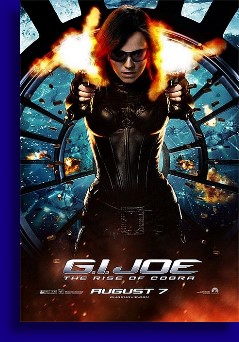

Reviewed by
Christopher Armstead


With the release of director Steven
Sommers film ‘G.I. Joe: The Rise of Cobra’ I suspect
it will be greeted with general derision from critics
who call it loud, obnoxious, stupid and brain dead
just to name a few derogatory adjectives, while the
film will still make more than enough money to justify
Paramount Pictures greenlighting two or three sequels. And while
it is true that G.I. Joe is indeed loud and obnoxious,
in the next few paragraphs I intend to challenge the
notion that it is stupid because I believe if you peel
away thick layer of simplicity of this film, a layer
that was installed as a necessity to guarantee mass
audience appeal, you will uncover a complex subtext
within this film that effectively attacks a number
global socio-economic morays that afflict our
existence. Be
forewarned that a SPOILER or two may occur during this
examination.
Please note that I saw this film with a team high level thinking intellectuals who assisted me in forming these opinions. There are three main issues that this movie confronts directly and they are Consumerism, Racism and Sexism. In this movie the M.A.R.S. Corporation which supplies the world most of its WMD’s and led by the scurrilous McCullen (Christopher Eccleston) has just taken the once benevolent technology of nanobots, and with NATO funding turned this tech into a fearsome weapon of mass destruction. The M.A.R.S. Corp. ships the first shipment of four nanobot warheads, guarded by a team of tough soldiers led by Duke (Channing Tatum) and his number one Ripcord (Marlon Wayans), who are subsequently attacked by the evil Cobra squad led by Duke’s old girlfriend Ana (Sienna Miller), now going by the moniker of The Baroness. This leads us to our discussion of how this film decries consumerism. This fictional nanobot technology, when unleashed, devours everything



in its path which is obvious symbolism representing the American consumers literal devouring of goods at a phenomenal rate, even in the face of a debilitating recession. To bolster this argument it is not an accident that the color of these nanobots is green, mirroring the color of money, and it’s also not a coincidence that these nanobots emanate from a foreign source representing our dependence on foreign goods, particularly oil. What is surprising, of course, is that on the surface this is a movie designed to spur greater consumerism, considering G.I. Joe is a Hasbro toy product after all. How Sommers and his crew adeptly wove in a message of anti-consumerism within a film that on the surface supports consumerism, obviously to pacify Hasbro executives, is not only brilliant but also courageous.
How ‘G.I. Joe: The Rise of the Cobra’ attacks racism is also a clever device but requires us to dig a little deeper. On the surface it would appear that changing the animated character of Ripcord’s race in this film, portrayed by Marlon Wayans, could be perceived as a politically correct move to enhance the films overall appeal, and while initially this may be true but it does prompt one to explore the relationship between Wayan’s Ripcord and Rachel Nichols Scarlett. Even in today’s society in the ‘Age of Obama’ there is an inherent risk in portraying an interracial relationship and while Ripcord’s and Scarlett’s relationship never escalates beyond that of a simple kiss, the more observant will be hard pressed not recognize the virtual sex the pair experienced during Ripcord’s chase of the armed warhead guided by Scarlett’s steady but soft hand. Without getting too graphic, the phallic parallel to Ripcord’s rocket plane were fairly obvious and his inability to ‘fire his rocket’ without the help of his woman was quite clear, and a clear attack on racism that would even make Huey P. Newton take notice.
Sexism is handled in this film via parody. On the surface Sienna Miller’s Baroness appears to be a strong willed independent minded modern woman. She shoots, stabs, and kills with almost reckless abandon, leading a group of violent male mercenaries while completely maintaining her femininity. You have to be pretty damn tough to stroll around the North Pole with your sexy outfit unzipped to your bellybutton exposing ones feminine gifts to the harsh elements while walking in the snow in stiletto heels. Now the critical moment in which The Baroness started to fracture was when she complemented a woman on her shoes. Not only does this circle back to consumerism, but it’s not long after this that The Baroness started remembering how ‘wonderful’ her life was with her ‘man’ Duke which eventually revealed to us that The Baroness was not in control of her mind after all. We see via flashback when Duke left Ana she was virtually useless as a woman and not until someone gained control of her mind, a male of course, was she able to function again. Not surprisingly, when that control was broken, she was useless yet again. Under the control of a man this was a woman who could scale skyscrapers in high heels, but left to her own mental devices she couldn’t even function enough to walk under her own power. If that’s not parody defined then I don’t what is.
The performances were similarly not what they appeared on the surface. While the untrained eye might surmise that star Channing Tatum has all of the charisma of wax figurine and even less acting ability than that wax figurine, when you consider the explosiveness of this film, his detached subdued performance was a calming force in this sea of chaos and was borderline brilliant. It called to mind the performance of Robert DeNiro in ‘The Deer Hunter’ or Robert Duvall in ‘Apocalypse Now’. Plus there was an Adebisi sighting (Adewale Akinnoye-Agbaje). Enough said.
There are so many underlying elements to this deceptively complex movie that I must leave some of these elements for you to uncover for yourself. So don’t be surprised if you observe the casting of the youthful Joseph-Gordon Levitt as the Cobra leader as a direct affront on the perils of child labor or examining the virtual enslavement of the Cobra soldiers as almost Darfourian in its representation. I’ll leave it for you to decipher why Paris, of all the cities on the planet, was the lone metropolis to suffer devastation or to translate the symbolism of the European Snake Eyes (Ray Park) besting the Asian Storm Shadow (Byung-hun Lee) in his own art.
We realize that Stephen Sommers isn’t known for making
the smartest movies with his mantra appearing to be ‘if
it doesn’t blow up… it better have cleavage’ but with
‘G.I. Joe: The Rise of the Cobra’ he has flipped the
script on us. I will be petitioning the local
community college to create a two credit class on the
social relevance of this amazing film, with myself as
instructor of course, because this is what it will take
to dissect the complexity that is ‘G.I. Joe: The Rise of
Cobra’. Damn I can’t wait to see what discussions
the sequel will hold.
